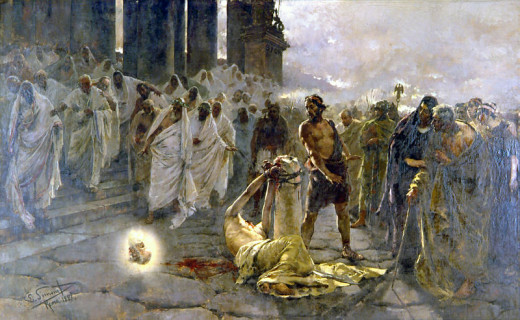Honor the Emperor: Disturbing Trends in Political Discourse

Many American Christians fall on the conservative side of the political spectrum. Some of these individuals are very critical of President Barack Obama. The attacks seem to get very personal and crude at times.
I've talked to many conservatives AND liberals over the past five years, and both groups have had reasons to be critical of the president. Conservatives think he opposes conservative American values. Liberals think he's not gone far enough in supporting liberal American values. In a republic with democratic tendencies as America is constituted, that differing opinions can be held is a good thing.
Christians who take the Bible seriously believe that they are to have a prophetic voice in society. However, it is important to be careful to respect those who are in authority, as the Bible also commands this attitude of submission.
Opening Disclaimer
I will openly admit that I am a Christian. Most people would consider my theological beliefs fairly conservative. I find some of the positions of the Obama administration problematic when lined up with the Christian ideal. I voted for him in neither election that he won. When President Clinton was in office, I participated in much of the hate-filled rhetoric against him that many on the right leveled. I owned both of Rush Limbaugh's works and watched his TV program at the time, thinking that he was the epitome of perfect philosophical engagement. My thinking has since changed.
I must also say that I find much of Libertarianism and what is considered modern Conservatism problematic when lined up with the Christian ideal as stated by Jesus and the Apostles. I believe that an open society in which religious and political liberty are practiced are much more preferable to those societies in which authoritarian regimes rule with an iron fist. However, I do not believe that any political system or ideology is perfect because people get involved in the process.
I find the lack of respect that is offered in political discourse to be quite troubling from a Christian perspective. I will note why in the words that follow below.

The Problem of Anti-Obama Memes
One thing that I have found to be quite popular amongst conservative Christians is the anti-Obama meme. These pictures of the president usually have derogatory statements or supposedly humorous statements about Obama. Many verge on the line of utter disrespect, if they do not jump right over the line.
Some of these memes or other pictures show the president looking like the Joker in Batman. Others say things like "Somewhere in Kenya, a village is missing their idiot" with the Obama campaign logo making up the "o" in idiot. Of course, there were and are similar concepts against the latest President Bush.
If professing Christians, whether they be from the left or right of the political spectrum, take any part of the Bible seriously, these types of discourse are not constructive. They go against the teachings of Jesus and the Apostles. Please note that I am not saying that there is no room for legitimate criticism of bad policy in a democratic republic. What I am saying is that complete disrespect for legitimate authority in such a crass manner goes against the clear teaching of the Bible.
Is posting a derogatory meme of President Obama acceptable for Christians?
Is Obama a Communist? The Problem with the Taxes Are Theft Argument
I've seen several people claim that President Obama is a Communist. Is Obama truly a communist, though? The definition of a communist system is one in which there is no private ownership of any property. By looking at the actual definition of communist, it is easy to see that President Obama is no Communist.
The argument that Obama is a Communist frequently comes from those who argue that taxes are theft taken at the edge of a gun. When the president signed off on the bill that raised income taxes on those making over $400,000 per year to just under 40%, these people yelped about the socialist president (it seems that socialism and communism are one and the same to these people).
Of course, some of the most anti-communist presidents in US history, such as JFK, Dwight D. Eisenhower, and Richard Nixon, oversaw a country that had marginal tax rates that topped out in the 70 to 90% range (and the country was actually in good economic shape with little debt in comparison to today's levels). Few would have thought these presidents communistic at the time.
It is important to go back to the argument that taxes are theft. In the Levitical law in the Old Testament, God himself told the Israelites to leave the corners of their fields and not to reap from them. He also told them not to go back and pick up any gleanings they dropped so that the poor, the widow, and the immigrant could have something to eat. This was in effect an official welfare tax on landowners. Additionally, the Jews paid taxes (tithes) to pay for the temple and for the Levites who worked there.
Some of the people who opposed Jesus tried to trick him in regard to taxes. These cats hated the Romans, they hated Jesus, and they tried to get him in trouble by asking him if it was right to pay taxes to Caesar in Mark 12. If he said no, he would look like he was trying to incite rebellion. If he said yes, he would look like he was in support of Rome. Instead, he asked whose image was on a coin and then told them the famous words "Render to Caesar that which is Caesars."
In other words, those who live in a society should pay taxes in that society to the legally established rulers. It is also important to keep in mind that the Romans were a conquering people extracting tribute from a population in which most people were not Roman citizens. In America, we have the ability to vote for the people who are in charge, even if the choices are less-than-stellar at times. We are to pay taxes and we are to honor those in charge.
The main point is that taxes are inevitable. The Jewish state under the theocracy had them, and the people did not exactly vote on them. Jesus himself said it was fine to pay them, even though much of what the Roman government did was against the ideals he put forth.
You Say You Want a Revolution?
There is irony just about anywhere people look. Before the election, many Tea Party types argued that good patriotic Americans should vote for Mitt Romney, because President Obama is anti-American. After Obama's reelection, some of these people started signing petitions asking their respective states be allowed to peacefully secede from the union. Of course, these requests were not taken seriously by most people, but it brings into question how "American" those who signed the documents actually are.
Others, like Donald Trump, called for Revolution after the election. From a historical standpoint, people of Trump's standing in society should be careful what they wish for. In most instances, it is the upper class that finds its interests in trouble during revolutions. Most are not like the American Revolution.
It does bring up the important question from a Christian standpoint. Does the Bible actually authorize a right to revolution. There are many people who argue that revolution is a right, but the arguments are usually related to Lockean ideas, rather than direct appeals to the Scriptures.
There are a couple of notable instances in which the righteous (read, the Jews) lived under oppressive foreign rule. The first comes from the Book of Daniel. The second comes from the New Testament. Neither of the regimes in question were exactly concerned with Judeo-Christian ethics, yet in neither case is there a call for revolution.
Daniel and the Babylonians
In 586 BC, the Babylonians defeated the ancient Israelites, they pillaged and looted, destroyed cities, and carried some of the most promising young people back to their capital of Babylon. The interaction between the Babylonian overlords and the children of the Hebrews is detailed in the Old Testament prophecy of Daniel.
The Babylonians gave the Hebrews new names that honored Babylonian gods. It is entirely likely that they took the Hebrews' manhood in the most literal sense possible. They encouraged them to leave their customs and their religion behind. It is hard to imagine a more oppressive situation. If ever there was a call for revolt, this would have been it.
Yet, the Hebrews, who remained loyal to their God, generally supported the local rulers. According to the text, they received high positions in the government. They were loyal, and only ran afoul when their allegiance to the Hebrew God was challenged. Even when told to bow down to an image of Nebuchadnezzar with the threat of being burned alive, they respectfully disobeyed. There was no attitude of "Nebuchadnezzar is a pooh-pooh head" or other comments of the sort. The resistance of unjust laws looked a lot more like Martin Luther King, Jr. that those of insurrectionists. An attitude of respect was quite evident throughout.

Jesus and the Apostles on Revolution
The number of texts in which Jesus or the Apostles clearly support revolt is quite short. In fact, it is difficult to find any text in which the New Testament supports open revolution. The closest might be Peter and John saying that they ought to "obey God, rather than men" in Acts 5. The incident in question related to Jewish religious leaders trying to keep these men from preaching the Gospel. This was not a call to revolution. It was merely a statement that the Apostles would continue to observe their religious obligations in spite of official opposition.
According to the accounts of the arrest of Jesus, Peter attempted to draw a sword to stop the proceedings by force. Jesus told him to put his sword away. The only revolution Jesus claimed to spread was a spiritual revolution. It might have political outcomes as people changed society, but it was not intended to be a violent insurrection.
It is also interesting that both Peter and Paul wrote to encourage their readers to obey the Roman authorities. According to Christian tradition, both of these men lost their lives to the Roman authorities. They viewed the spread of Christianity's message as more important than political revolt against a corrupt temporal government.
Peter wrote in relation to the place of Christian believers in an anti-Christian society in the second chapter of his first epistle. Note especially verses 13 and 17:
Living Godly Lives in a Pagan Society
"11 Dear friends, I urge you, as foreigners and exiles, to abstain from sinful desires, which wage war against your soul. 12 Live such good lives among the pagans that, though they accuse you of doing wrong, they may see your good deeds and glorify God on the day he visits us.
13 Submit yourselves for the Lord’s sake to every human authority: whether to the emperor, as the supreme authority, 14 or to governors, who are sent by him to punish those who do wrong and to commend those who do right. 15 For it is God’s will that by doing good you should silence the ignorant talk of foolish people. 16 Live as free people, but do not use your freedom as a cover-up for evil; live as God’s slaves. 17 Show proper respect to everyone, love the family of believers, fear God, honor the emperor." (NIV)
Likewise, Paul preached the same message. Note his writings in Romans 13:
"Let every person be subject to the governing authorities. For there is no authority except from God, and those that exist have been instituted by God. 2 Therefore whoever resists the authorities resists what God has appointed, and those who resist will incur judgment. 3 For rulers are not a terror to good conduct, but to bad. Would you have no fear of the one who is in authority? Then do what is good, and you will receive his approval, 4 for he is God's servant for your good. But if you do wrong, be afraid, for he does not bear the sword in vain. For he is the servant of God, an avenger who carries out God's wrath on the wrongdoer. 5 Therefore one must be in subjection, not only to avoid God's wrath but also for the sake of conscience. 6 For because of this you also pay taxes, for the authorities are ministers of God, attending to this very thing. 7 Pay to all what is owed to them: taxes to whom taxes are owed, revenue to whom revenue is owed, respect to whom respect is owed, honor to whom honor is owed." (ESV)
This passage, as well as the one penned by Peter, are arguments to both honor and obey the ruling authorities. It is important to keep in mind that the Romans were not exactly paragons of righteousness. They killed Christians from time to time and would kill both writers--not exactly a pro-life position. The Apostles did not call for anti-Caesar memes. They did not call for open rebellion. They called for obedience, honor, and respect to the governing authorities. They said paying taxes and revenues to Rome was the right thing to do, not that it was theft on the part of the Romans.
The Roman emperors were not good guys in just about anyone's sense of morality and ethics. They claimed divinity for themselves. Yet, the Apostles called for good Christians to follow them. I've repented of my disrespect back in the days of the Clinton administration. Though I disagree with some of the actions of the Obama administration, going past stating my honest disagreement with these policies and entering the realm of degrading or slandering the president is something that I attempt to avoid. A Christian America has never been a reality, and Jesus himself stated that his kingdom is not of this world. Therefore, Christians are called to simultaneously live in the City of Man and the City of God.
I may not have voted for President Obama, but he is a God-ordained authority at this time. Therefore, I am called to honor and respect him.










